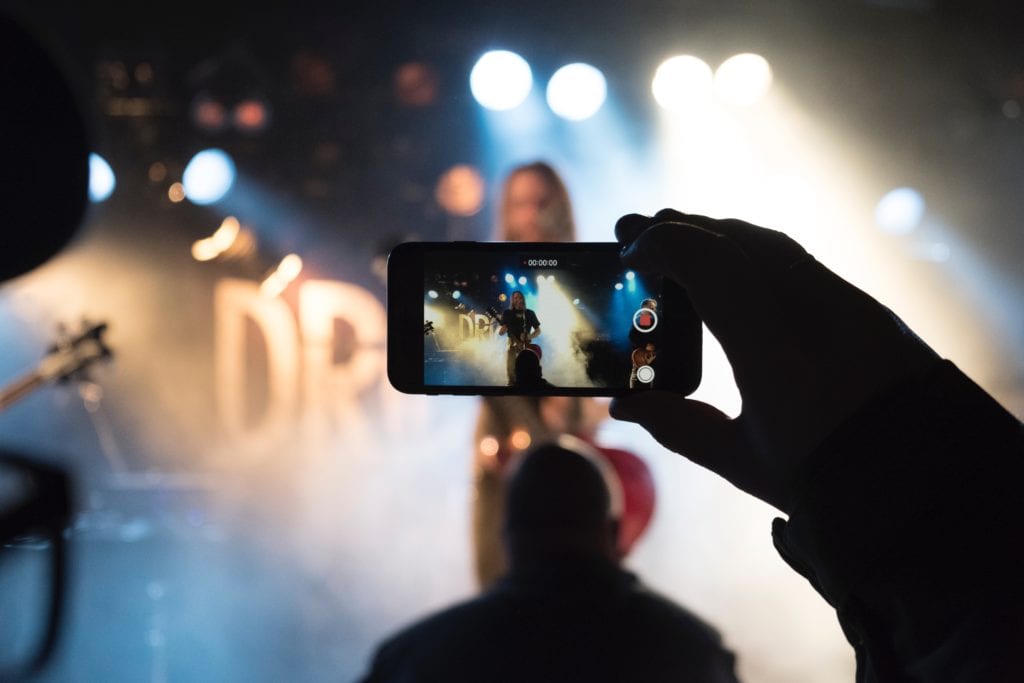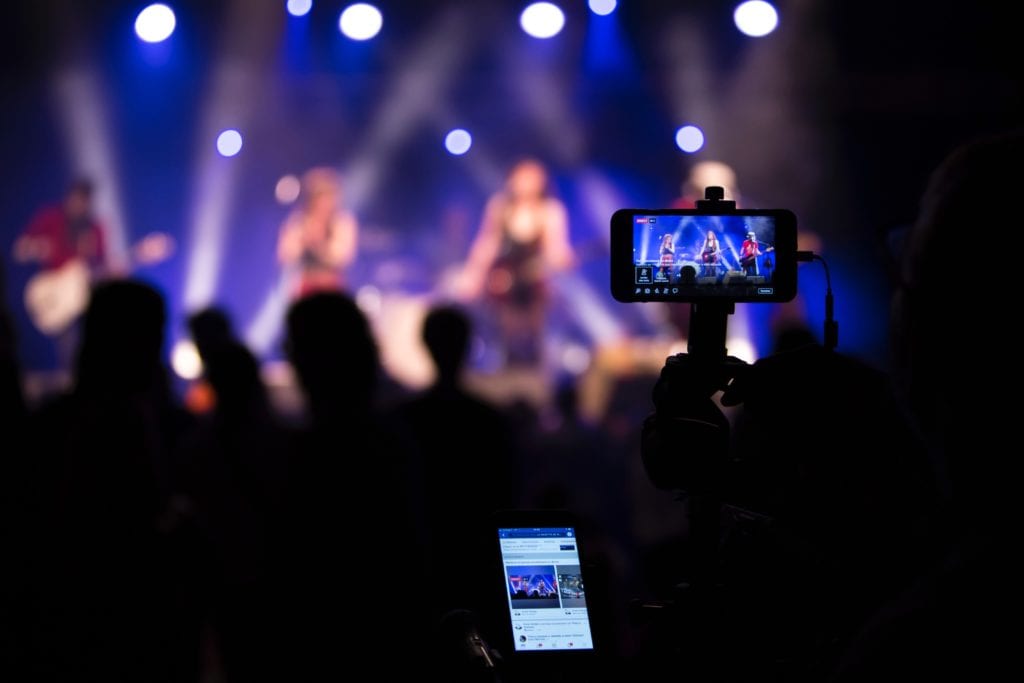We’re nerding out on how to live stream your event today! It’s a fantastic new time we’re living in, no doubt. And an exceptionally exciting one for the event industry. Nowadays, there are countless options to choose from if you want to take your event to the next level. Of course, one of these cool choices is the possibility of live streaming your event. Think about it: you can get people from all over the world to experience your event, without having to physically attend!
Of course, this comes with its perks and complications. Everything does, but live streaming is definitely worthwhile. And if you have any questions or doubts lingering when it comes to this, don’t worry. On this week’s Event Tech Podcast, Will Curran and Brandt Krueger have got you covered. Let’s take the leap and learn all about event live streaming!
 Event Live Streaming: The Audience
Event Live Streaming: The Audience
When it comes to live streaming, it’s really important you go above and beyond just pointing a camera towards what is happening. “In a sense, you’re creating a new audience, you have the in-person audience and the virtual audience”, says Brandt. So, it’s paramount you remember both these audiences and not just one of them.
“You’re engaging with the people in the room, and you’re engaging with the people watching”, Will states. Think about your attendees, both in person, and remote – they all matter just as much! “What do you want your remote watchers to get out of it? What does your remote audience look like?” – these are some of the questions you need to ask yourself once you start planning.
Event Live Streaming: Cannibalization & Security
It’s normal that some hesitation still exists when it comes to live streaming. This stems essentially from the fear that it will cannibalize your live audience. However, numbers show something entirely different. “Of the people who actually produced a hybrid meeting or event, in the first year afterward, 67% did not see a decline in live numbers. 65% actually said attendance stayed the same, and 23% saw an increase in live attendance numbers”, says Brandt.
The same goes for security. Nowadays, “security really isn’t an issue at this point, any streaming service will offer some basic level of security”, is Will’s guarantee.
So, in the end, live streaming “it’s not going to affect your live audience, it’s not a security problem, it can actually save you money, and it could be a revenue driver if you’re actually increasing your attendance because you put on such an amazing live stream people actually want to come.” Sounds pretty good so far!
Event Live Streaming: The Technology Side
Obviously, if we’re dealing with live streaming, we’re dealing with technology. And on this matter, there are a couple of things you’ll need to keep in mind:”first, you need a thing to capture it – whether it’s a camera or additional equipment”, says Will. On this aspect, try to go the extra mile and don’t just settle for the basics. “A shaky camera in the background isn’t going to make it”, warns Brandt. People are expecting more, so “you have to start bringing in extra pieces of equipment” in order to take the experience to the next level.
Next, “you need a place for it to live. What platform will it be in?”, Will reminds. There’s more than enough to choose from, but which one is right for you? Which one better fits your event?
Finally, “the third component is everything surrounding it – the chat, the pooling, how are you going to engage your audience?”. Again, engagement is key! If you want people to come, and if you want them to stay, you need to give them something that’ll keep them in the loop.
Event Live Streaming: The Core Team
When it comes to the production side, there are also a few key roles you want to determine and assign. In order to make sure the whole live streaming is a success, you’ll need, first, a producer, “someone who is in charge of understanding the live stream audience, someone who can really dedicate their energy to think: what are the audiences seeing? What sort of content do they want to see? Are they engaged?”.
You’ll also want to add your techie person, “like a live stream technician. Someone who understands the cameras, who understands how it all works, someone who is geeky enough to figure out that sort of thing”, says Will.
When it comes to filming, you’ll definitely want some camera operators, “someone who can think about cool angles to get, add someone to run each camera as you go along.” Along with this, think about a video engineer, “someone who’s going to control the switching element of it. Decide this camera is good, this is not good. Okay, I’m gonna cut to this angle and now I’m keeping it at the PowerPoint”.
Finally, the further you decide to take your experience, the more specialized people you’ll need. For this, Will also recommends that you bring in an encoding engineer and someone on the server side.
Additionally, on the issue of Internet speed, “make sure you have a hardwired dedicated Internet line to your live stream. Do not use WiFi and do not use anything that is shared with someone.”
 Event Live Streaming: Platforms
Event Live Streaming: Platforms
“An important thing to keep in mind is that your audience needs to have one of those social media accounts in order to watch”, Will reminds. We all know what we have at our disposal, from Facebook to YouTube and Instagram. “Social Media, it gets a little complex – you’re kind of on your own when it comes to those”, warns Will. There’s always the possibility of crashing and you don’t really get someone on the server side to help you.
However, if you’re looking to reach a big number of people or use a community you already have, social media is great.” But still, “if you’re looking into having full control over every detail, check out about having a third party platform” – it’s Will’s final word on the issue of platforms.
Event Live Streaming: Engaging
Back at the core of everything, it’s engagement! When considering your remote audience, “you need to have a platform that allows them to engage. In person, you have coffee breaks and people run into each other in the hall. How do you mimic this for live stream?”, says Brandt.”Engage, engage, engage, It’s all about engaging”.
A solid tip from Brandt is to “start thinking like a television producer – having multiple angles, moving, trying to avoiding dead space”. Additionally, “make sure they have a way to give that feedback, back. Consider them having their own MC, being the voice of the remote audience in the room.” Remember, it’s important that even though they’re not physically there, they still feel like part of the experience, like they have a voice.
“Have sort of a third audience”, Brandt recommends, “a group of remote audience that gets together to watch. You still get to have this nice little hybrid, so consider having a pod.”
Another key aspect to keep in minds is “prepare your speakers”, warns Brandt. They must be aware who their entire audience is, and “really make sure they give those remote watchers a chance to answer questions”.
Conclusion
Of course, because we’re talking about technology, it’s always good to remember that “there’s always going to be troubleshooting – make sure you give enough time for it. Make sure the live stream is up and running just in case along the line we have a failure”. Nothing will ever be perfect, and “you have to be okay with a small group of people who will not be able to do it – and prepare your stakeholders. The benefits outweigh the problems”, reminds Brandt
What are your opinions on event live streaming? Have you ever been on either of the sides? How was your experience? Let us know in the comment section!
Resources:
How to Engage Your Live Stream Audience – #EventIcons Episode 80










